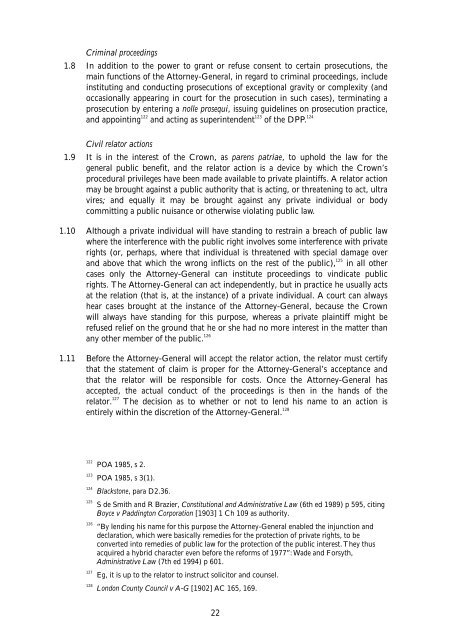cp149 Consents to Prosecution consultation - Law Commission
cp149 Consents to Prosecution consultation - Law Commission
cp149 Consents to Prosecution consultation - Law Commission
Create successful ePaper yourself
Turn your PDF publications into a flip-book with our unique Google optimized e-Paper software.
Criminal proceedings<br />
1.8 In addition <strong>to</strong> the power <strong>to</strong> grant or refuse consent <strong>to</strong> certain prosecutions, the<br />
main functions of the At<strong>to</strong>rney-General, in regard <strong>to</strong> criminal proceedings, include<br />
instituting and conducting prosecutions of exceptional gravity or complexity (and<br />
occasionally appearing in court for the prosecution in such cases), terminating a<br />
prosecution by entering a nolle prosequi, issuing guidelines on prosecution practice,<br />
and appointing 122<br />
and acting as superintendent 123<br />
of the DPP. 124<br />
Civil rela<strong>to</strong>r actions<br />
1.9 It is in the interest of the Crown, as parens patriae, <strong>to</strong> uphold the law for the<br />
general public benefit, and the rela<strong>to</strong>r action is a device by which the Crown’s<br />
procedural privileges have been made available <strong>to</strong> private plaintiffs. A rela<strong>to</strong>r action<br />
may be brought against a public authority that is acting, or threatening <strong>to</strong> act, ultra<br />
vires; and equally it may be brought against any private individual or body<br />
committing a public nuisance or otherwise violating public law.<br />
1.10 Although a private individual will have standing <strong>to</strong> restrain a breach of public law<br />
where the interference with the public right involves some interference with private<br />
rights (or, perhaps, where that individual is threatened with special damage over<br />
and above that which the wrong inflicts on the rest of the public), 125<br />
in all other<br />
cases only the At<strong>to</strong>rney-General can institute proceedings <strong>to</strong> vindicate public<br />
rights. The At<strong>to</strong>rney-General can act independently, but in practice he usually acts<br />
at the relation (that is, at the instance) of a private individual. A court can always<br />
hear cases brought at the instance of the At<strong>to</strong>rney-General, because the Crown<br />
will always have standing for this purpose, whereas a private plaintiff might be<br />
refused relief on the ground that he or she had no more interest in the matter than<br />
any other member of the public. 126<br />
1.11 Before the At<strong>to</strong>rney-General will accept the rela<strong>to</strong>r action, the rela<strong>to</strong>r must certify<br />
that the statement of claim is proper for the At<strong>to</strong>rney-General’s acceptance and<br />
that the rela<strong>to</strong>r will be responsible for costs. Once the At<strong>to</strong>rney-General has<br />
accepted, the actual conduct of the proceedings is then in the hands of the<br />
rela<strong>to</strong>r. 127<br />
The decision as <strong>to</strong> whether or not <strong>to</strong> lend his name <strong>to</strong> an action is<br />
entirely within the discretion of the At<strong>to</strong>rney-General. 128<br />
122 POA 1985, s 2.<br />
123 POA 1985, s 3(1).<br />
124 Blacks<strong>to</strong>ne, para D2.36.<br />
125 S de Smith and R Brazier, Constitutional and Administrative <strong>Law</strong> (6th ed 1989) p 595, citing<br />
Boyce v Padding<strong>to</strong>n Corporation [1903] 1 Ch 109 as authority.<br />
126 “By lending his name for this purpose the At<strong>to</strong>rney-General enabled the injunction and<br />
declaration, which were basically remedies for the protection of private rights, <strong>to</strong> be<br />
converted in<strong>to</strong> remedies of public law for the protection of the public interest. They thus<br />
acquired a hybrid character even before the reforms of 1977”: Wade and Forsyth,<br />
Administrative <strong>Law</strong> (7th ed 1994) p 601.<br />
127 Eg, it is up <strong>to</strong> the rela<strong>to</strong>r <strong>to</strong> instruct solici<strong>to</strong>r and counsel.<br />
128 London County Council v A-G [1902] AC 165, 169.<br />
22
















